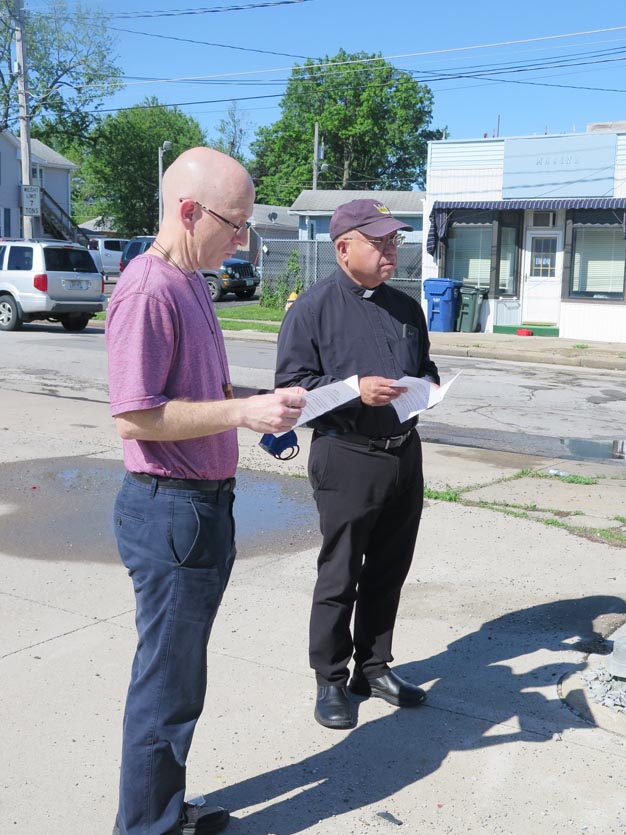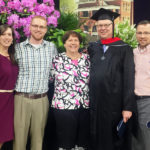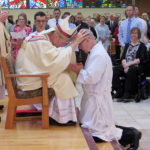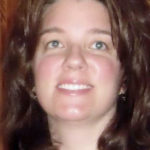By Barb Arland-Fye
The Catholic Messenger
DAVENPORT — Father Rudolph Juarez, pastor of a busy downtown parish, has taken on another responsibility, serving on the Violent Crime Community Task Force that Davenport Mayor Mike Matson created in response to rising violent crime in the city.
Matson announced formation of the task force June 1. The city reached an all-time high of incidents of shots fired and non-fatal shootings in 2020 and the violence has continued in 2021, according to a statement on the City of Davenport website. Davenport Police Chief Paul Sikorski said these acts of violence are not random, but attributable to hybrid street gangs continually retaliating against one another, the statement said.

Kent Ferris, left, and Father Rudolph Juarez pray at an event sponsored by Davenport Bearing Witness for victims of shootings in Davenport on May 26.
“The unfortunate reality is that these gangs are comprised predominately of minority youth, with the majority of gun crime perpetrators and victims being young African American males,” Sikorski said. “Three African American teenagers have been murdered in the past nine months as a result of this retaliatory violence, and this should be completely unacceptable to our community.”
Task force members from NAACP, LULAC, Davenport Community Schools, Vera French Mental Health Services, the Diocese of Davenport, St. Ambrose University and other organizations, are striving to help the city develop community-based solutions to violence.
“I see myself as being one voice among many in the community,” Father Juarez said of his role on the task force. “I’m there to be a priest among the people, to be a friend, an advocate for peace,” he told The Catholic Messenger. “Violence takes on many different forms. Community dialogue has become harsher and harsher. People judge too quickly and speak too quickly. There is a lack of charity, respect for the other person. Denigration of the other person leads to this climate of disrespect. That lack of respect helps to enable violence.”
The roots of violence feed on hopelessness, a sense of despair, the priest said. “Marginalization has increased in our society… all of us have to contribute to the common good by working for justice, leveling the playing field and access to what constitutes quality of life. Extend the safety net to more families so that they can lift themselves up,” he said. Families and individuals living on the peripheries of society do not have the same access to the economic, spiritual and moral support that people who do not struggle to make ends meet can access.
“Violence, to me, is a spiritual problem. We are spiritually sick and morally sick. In a more loving, caring, prosperous society there would be evidence of respect for the person and well-being of everybody. Maybe we don’t listen to each other. We’re too busy extrapolating our own view of the world.” However, people have more in common than they realize, he said. “We want to love and be loved. We want to be accepted, we want a place in society.”
The task force must address systemic issues such as racism, lack of stability in the family and the impact of education to bring about change. Furthermore, “we need a better working relationship between the community and police. We need to do something about guns. These are things we’ve been talking about for a generation and should have been able to resolve.”
Father Juarez emphasized that “any solution to gun violence in our community must be balanced. We cannot and should not tolerate lawlessness but we also need to realize that violence doesn’t happen in a vacuum, any number of factors lead to people acting out with violence. So, a two-pronged approach is needed, not an either/or all law enforcement or all community intervention. But more like a carrot and a stick. Build up community relations and trust, work at fairness in our justice system and do strategic enforcement and punishment when called for.”
The task force voted unanimously to keep the meetings closed from the press for now, Father Juarez said. “We’re able to process our thoughts without being under a microscope. The limelight of the public eye can sometimes limit what you say for fear of being criticized. Eventually, all of the committee’s recommendations will be made public.” The Quad-City Times reported July 22 that Matson encouraged community members who are not part of the task force to attend listening sessions in the coming months regarding the group’s work.
Father Juarez participates on the task force’s education work group, focusing on schools and neighborhoods “to see what kind of efforts could be made to help foster a more positive environment for young people.”
Loxi Hopkins, a Diocese of Davenport volunteer and task force member, said, “What I’m really hoping is that by everyone from different walks of life putting their heads together, we can come up with some kind of solution to what’s going on. We’re losing way too many kids.”
“I wonder what would happen if people in our faith community would go to the juvenile detention center and pray over these kids when they are brought in on crimes. Would it show these kids there are people who care about them?”











